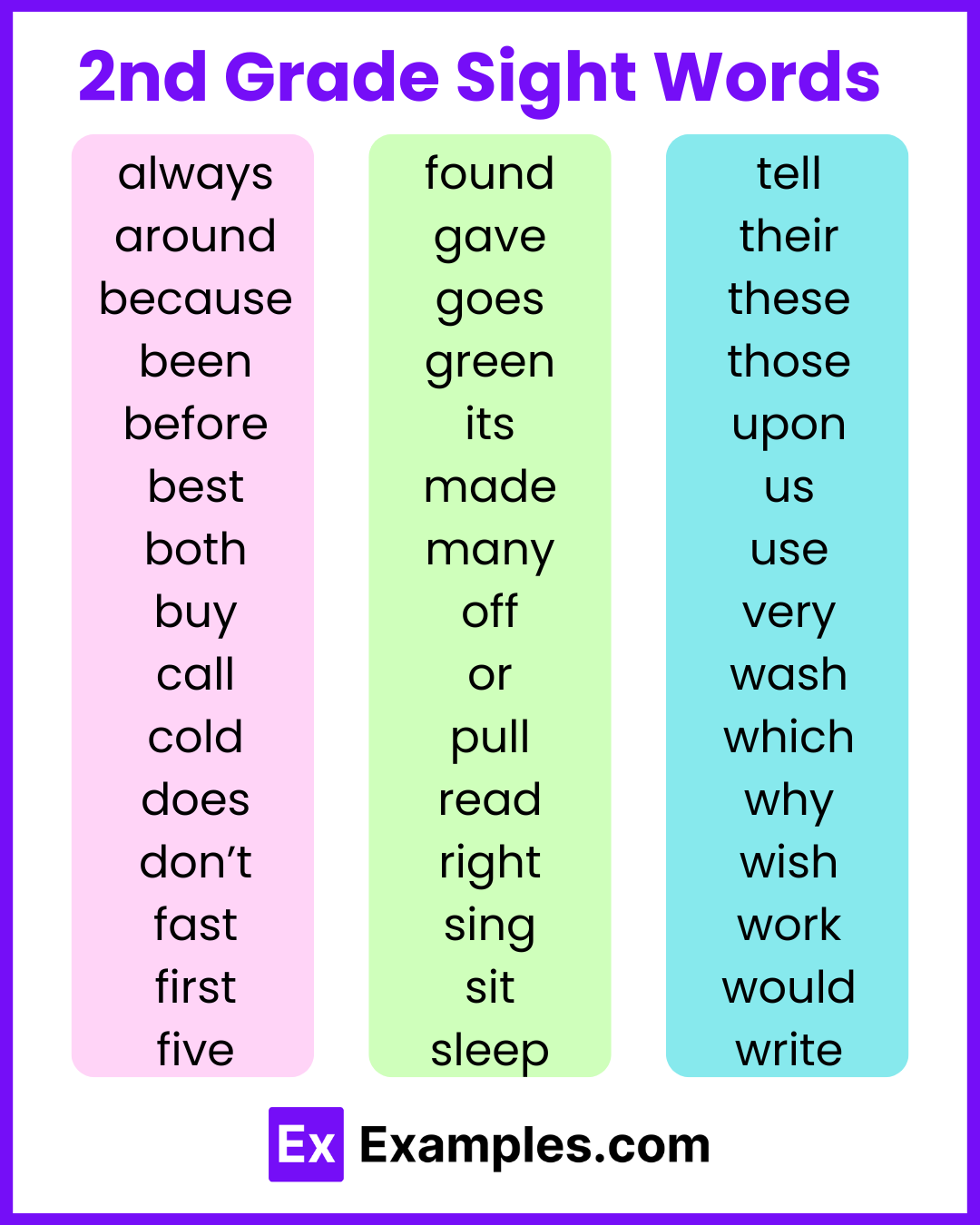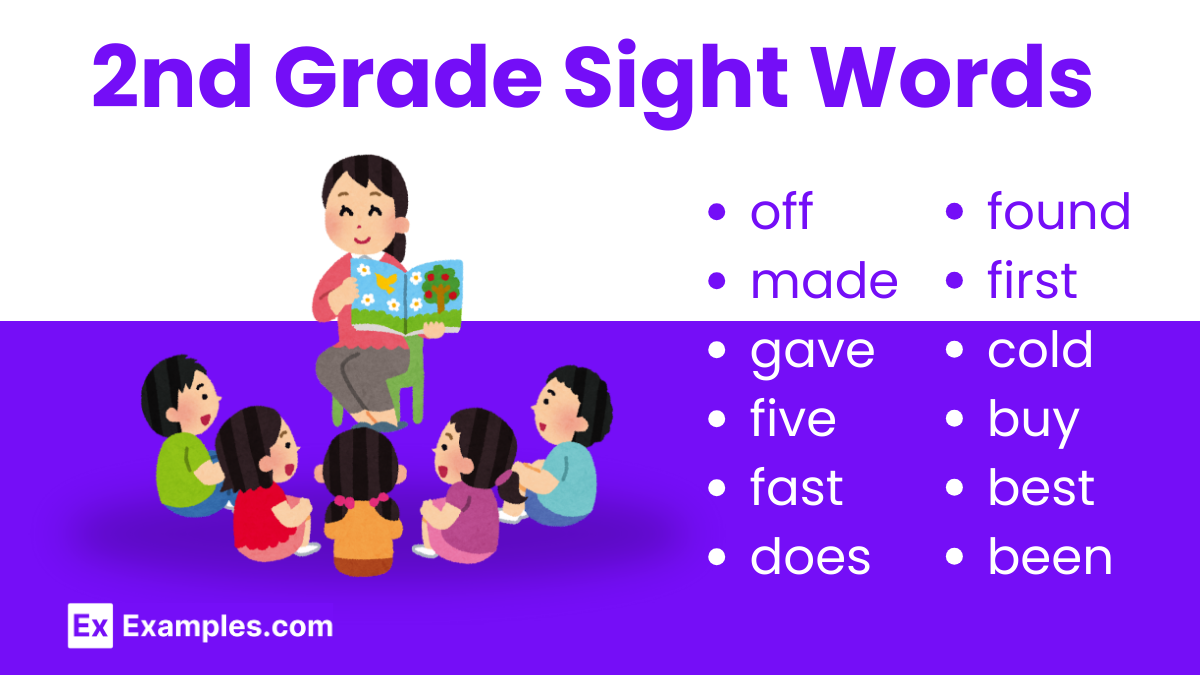100+ 2nd Grade Sight Words List, Meaning, PDF
Sight words are important for young learners, starting from preschool. By the time kids reach 2nd grade, they’re already familiar with basic sight words, which helps boost their confidence in reading. As they move through elementary school, the sight words they learn become a bit more complex, like those found in 2nd grade. Understanding and using these words is key to improving reading and writing skills. Fun activities can make learning these words easier and more memorable for kids, helping them build sentences that make sense. Let’s explore the world of 2nd grade sight words and see how they play a crucial role in a child’s learning journey.
List of 2nd Grade Sight Words

| always | around |
| because | been |
| before | best |
| both | buy |
| call | cold |
| does | don’t |
| fast | first |
| five | found |
| gave | goes |
| green | its |
| made | many |
| off | or |
| pull | read |
| right | sing |
| sit | sleep |
| tell | their |
| these | those |
| upon | us |
| use | very |
| wash | which |
| why | wish |
| work | would |
| write | your |
List of Second Grade Sight Words with Meanings and Usage
| Sight Word | Meaning | Usage in a Sentence |
|---|---|---|
| always | At all times; on every occasion | “I always brush my teeth before bed.” |
| because | For the reason that | “She wore a coat because it was cold outside.” |
| before | At an earlier time | “Finish your homework before you play video games.” |
| buy | To acquire in exchange for money | “Let’s buy some ice cream after school.” |
| cold | Having a low temperature | “I like drinking cold water in the summer.” |
| does | 3rd person singular of “do” | “He does his homework every evening.” |
| fast | Moving or capable of moving at high speed | “She can run really fast.” |
| found | Past tense of “find” | “They found a lost puppy in the park.” |
| gave | Past tense of “give” | “My friend gave me a birthday present.” |
| green | A color between blue and yellow | “The grass is very green in spring.” |
| many | A large number of | “There are many stars in the sky at night.” |
| off | Not on; away from | “Please turn the light off when you leave.” |
| pull | To exert force on (someone or something) to cause movement towards oneself | “You need to pull the door to open it.” |
| read | To look at and comprehend the meaning of written or printed matter | “I like to read books before bedtime.” |
| right | Correct; opposite of left | “Turn right at the corner to get to the library.” |
| sing | To make musical sounds with the voice | “We will sing songs around the campfire.” |
| sleep | A state of rest in which the eyes are closed and there is little conscious thought | “I need to get some sleep; I’m very tired.” |
| tell | To communicate information to someone in spoken or written words | “Can you tell me a story?” |
| very | To a high degree | “This chili is very spicy.” |
| work | Activity involving mental or physical effort done to achieve a purpose or result | “My mom goes to work every day.” |
Benefits of Learning 2nd Grade Sight Words
Enhanced Reading Fluency
- Faster Recognition: Sight words are common in texts; recognizing them quickly helps children read more smoothly.
- Improved Pace: As children memorize sight words, they spend less time decoding, leading to faster reading.
Boosted Comprehension
- Better Understanding: Knowing sight words allows children to focus on the meaning of the text, improving comprehension.
- Contextual Learning: Understanding these words in various contexts enhances a child’s ability to grasp nuanced meanings.
Increased Confidence
- Reading Confidence: Mastery of sight words boosts children’s confidence in their reading abilities, encouraging them to explore more complex texts.
- Writing Confidence: Familiarity with sight words aids in writing, as children can express themselves more freely and accurately.
Foundation for Future Learning
- Academic Readiness: A solid grasp of sight words prepares children for the increased reading demands of higher grades.
- Language Skills: Learning sight words supports the development of broader language skills, including vocabulary and grammar.
Promotes Independent Reading
- Self-Sufficiency: Children who know sight words are more likely to read independently, fostering a love for reading.
- Literacy Enjoyment: With the ability to read more fluently, children are likely to enjoy reading and view it as a pleasurable activity.
Supports Writing Skills
- Spelling Improvement: Many sight words are irregularly spelled and learning them helps in memorizing their spellings.
- Expressive Writing: Knowing sight words allows for more fluid writing, enabling children to focus on storytelling or conveying information.
Critical Thinking and Analysis
- Analytical Skills: As children become more comfortable with sight words, they can better analyze and interpret text.
- Problem-Solving: Decoding words smoothly aids in focusing on problem-solving skills within the context of reading comprehension.
How to Teach 2nd Grade Sight Words to Kids
- Use Flashcards: Quick and visual, flashcards can make memorization fun.
- Play Games: Incorporate sight words into games like bingo or memory match to keep learning enjoyable.
- Read Together: Point out sight words while reading stories aloud to help with recognition.
- Encourage Writing: Have kids practice writing sentences using sight words to improve their usage.
- Daily Practice: A little bit of daily review can greatly enhance word retention.
- Use Technology: Apps and videos designed for sight word learning can be both educational and entertaining.
- Personalize Learning: Tailor activities to fit the child’s learning style for more effective engagement.
Tips for Teaching 2nd Grade Sight Words to Kids
- Integrate Play: Turn learning into a game. Activities like sight word bingo, word fishing, and scavenger hunts make learning enjoyable and engaging.
- Incorporate Multimedia: Utilize videos, songs, and interactive apps that focus on sight words. These tools cater to various learning styles and keep children interested.
- Consistent Exposure: Place sight words around the learning environment. Use word walls, labels around the classroom or home, and flashcards to reinforce daily exposure.
- Encourage Reading: Select books appropriate for the 2nd grade level that incorporate sight words. Reading together and highlighting these words can reinforce learning.
- Make It Hands-On: Activities like building words with letter tiles, tracing words in sand or with finger paints, and cutting out words from magazines help kinesthetic learners.
- Personalize the Experience: Tailor the learning process to each child’s interests and learning pace. Use their favorite stories or topics to create custom sight word materials.
- Utilize Writing: Encourage kids to write sentences or short stories using sight words. This not only helps with memorization but also with understanding context and usage.
- Regular Review: Consistently review previously learned words while introducing new ones to ensure retention and build confidence.
Fill in the Blanks with Sight Words
Instructions: Choose the correct sight word from the choices below to complete each sentence.
- I ________ brush my teeth in the morning and at night.
- a) always
- b) around
- c) because
- d) before
- The birds fly ________ in the sky.
- a) best
- b) both
- c) buy
- d) around
- We wear our coats ________ it is cold outside.
- a) because
- b) best
- c) does
- d) fast
- ________ going to bed, I read a book.
- a) Before
- b) Buy
- c) Both
- d) Best
- She did her homework ________ than her brother.
- a) both
- b) buy
- c) best
- d) because
- ________ my friend and I went to the park.
- a) Both
- b) Best
- c) Does
- d) Fast
- Did you ________ a new pencil at the store?
- a) always
- b) around
- c) because
- d) buy
- I feel ________ when I drink a warm drink.
- a) always
- b) cold
- c) does
- d) fast
- She ________ finishes her lunch quickly.
- a) does
- b) both
- c) best
- d) fast
- Walk ________, so you don’t fall.
- a) best
- b) both
- c) does
- d) fast
Answers:
- a) always
- d) around
- a) because
- a) Before
- c) best
- a) Both
- d) buy
- b) cold
- d) fast
- d) fast


